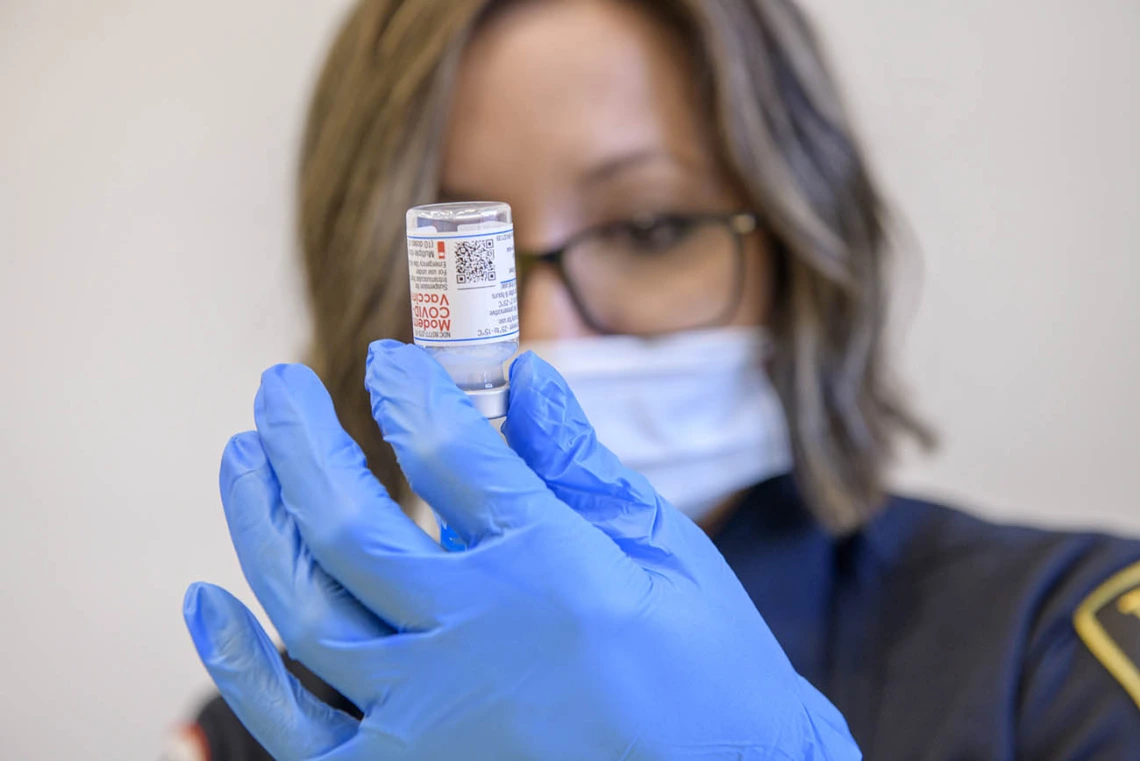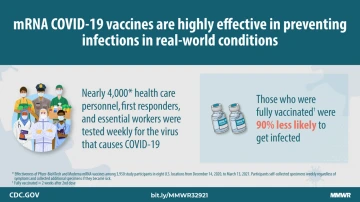AZ HEROES Research Study Data Confirm Vaccines Highly Effective in Real-World Conditions Against COVID-19
AZ HEROES study data show a 90% effective rate after the recommended two doses of Pfizer and Moderna COVID-19 vaccines, confirming trial studies.

The first U.S. data to measure vaccine effectiveness against both symptomatic and asymptomatic COVID-19 specifically among first responders, health care and frontline workers show that the vaccines are highly effective in real-world working conditions.
Data from ongoing University of Arizona Health Sciences research studies have confirmed the findings from Phase III clinical trials conducted by Pfizer-BioNTech and Moderna for COVID-19 vaccine approval. The findings, published by the U.S. Centers for Disease Control and Prevention, are the first in the U.S. to measure vaccine effectiveness against both symptomatic and asymptomatic COVID-19 specifically among first responders, health care and frontline workers, and show that both vaccines are highly effective in these real-world working conditions.

The data, published in the CDC’s Morbidity and Mortality Weekly Report, were collected from December to March from nearly 4,000 participants across several states. The studies showed that during this initial vaccination campaign under real-world conditions, two doses of the mRNA vaccines were 90% effective against infection with SARS-CoV-2, the virus that causes COVID-19. Additionally, the research revealed that a single dose of vaccine proved 80% effective against COVID-19.

Jeff Burgess, MD, MS, MPH
The paper incorporates data from two CDC-funded stories: the AZ HEROES study and the Abt Associates-led Research on the Epidemiology of SARS-CoV-2 in Essential Response Personnel (RECOVER) study.
In contrast to the Pfizer-BioNTech and Moderna Phase III clinical trials, which only evaluated symptomatic infections, the AZ HEROES and RECOVER studies measure both symptomatic and asymptomatic infections. Additionally, the AZ HEROES and RECOVER studies involve only healthcare workers, first responders and other essential and frontline workers – all individuals with high risk of SARS-CoV-2 exposures from patients, co-workers or the public.
The AZ HEROES study was launched last year by researchers at the UArizona Zuckerman College of Public Health and the UArizona College of Medicine – Tucson, thanks to a $7.7 million CDC grant. The study initially sought to evaluate incidence of asymptomatic and symptomatic COVID-19 infection and reinfection among health care personnel, first responders and other essential workers, and to establish patterns of COVID-19 immunity over time in previously and newly infected individuals who test positive for COVID-19 antibodies.
With direction from the CDC, the AZ HEROES study expanded to evaluate vaccine efficacy in December 2020. The RECOVER study spans several states, including Arizona, Florida, Minnesota, Oregon, Texas and Utah. Alberto Caban-Martinez, DO, PhD, MPH, CPH, associate professor in the Department of Public Health Sciences at the University of Miami Miller School of Medicine, leads the Florida RECOVER study.
Moving forward, newer vaccines, including single-dose vaccines and potentially vaccine boosters for SARS-CoV-2 variants, will be examined. Researchers will also continue to investigate how long immunity to COVID-19 lasts after vaccination and how long immunity to reinfection lasts for study participants who have already had COVID-19.
AZ HEROES researchers will also continue to characterize the knowledge, attitudes and practices related to COVID-19 vaccines among essential workers. Researchers will examine the associations between those three factors and subsequent vaccination behaviors, including vaccine refusal, hesitancy or incomplete adherence to vaccination recommendations.
In addition to Dr. Burgess, the AZ HEROES research team includes: Karen Lutrick, PhD, assistant professor in the Department of Family and Community Medicine at the College of Medicine – Tucson, Janko Nikolich-Zugich, MD, PhD, head of the College of Medicine – Tucson’s Department of Immunobiology and co-director of the Center on Aging; and Kate Ellingson, PhD, Joe Gerald, MD, PhD, and Xiaoxiao Sun, PhD, at the Zuckerman College of Public Health.
AZ HEROES is still recruiting participants, including health care workers, first responders, and other frontline and essential workers, as well as student workers who have not already been vaccinated. Participants both with and without past COVID-19 infection are welcome to join.
To learn more about the study please visit the AZ HEROES website: https://azheroes.arizona.edu/
Contact
Shipherd Reed
520-626-9669
shipherd@email.arizona.edu

